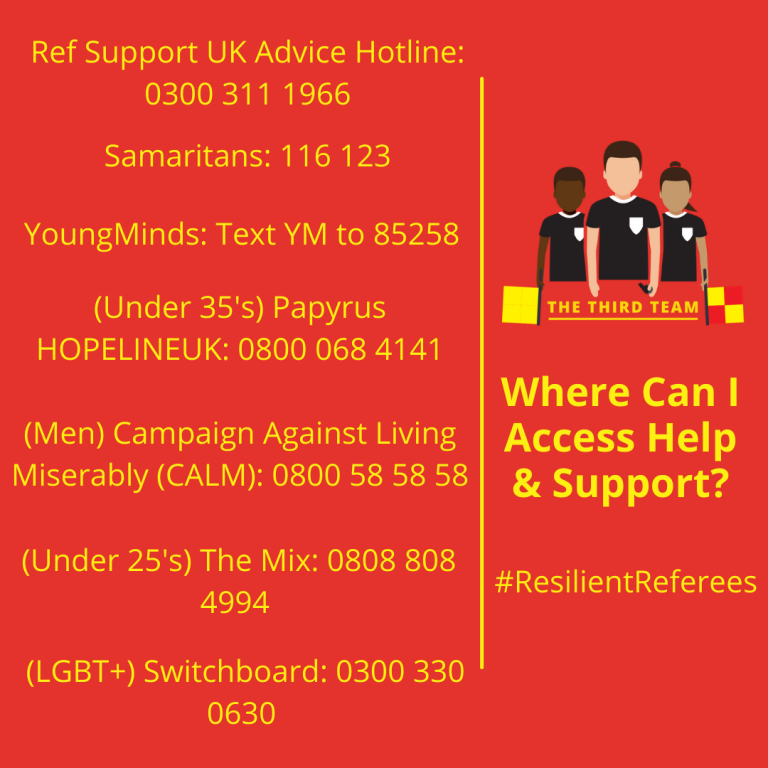This week it was Time to Talk Day. Time to Talk Day is the UK’s biggest mental health conversation. Happening every year, it’s a day for friends, families, colleagues, and groups to come together to talk, listen and enhance lives.
Worryingly, almost one in four young people today will experience depression before they are 19- years-old, according to the NHS. In fact, most children and young people will be emotionally or mentally affected by things that are out of our control at some point in their lives.
Whilst we can’t be protected from everything life throws at us, we can ensure that we have the right tools to help us deal with challenges as we move from childhood, into adulthood. Unsurprisingly, exercise, in the form of refereeing, is one of those very important tools!
Officiating is a great way to ensure that we are not only physically fit, but also ensures that we’re mentally stimulated and supported too.
Body Boost
Refereeing is actually effective in helping reduce fatigue, improving concentration, boosting alertness and enhancing your brain’s general function.
It also encourages the production of ‘happy chemicals’ – endorphins – which will naturally boost your mood. People often talk of a ‘runners high’, but this can actually be achieved through any exercise, including officiating, that helps your heart beat faster, increases your breathing rate and makes you feel warmer.
Endorphins also act as the body’s natural painkillers, which means regular movement out on the field of play can help soothe any stress that manifests itself through physical pain, such as headaches and stomach aches.
Rest & Recouperation
A good night’s sleep is essential for the body to repair and develop, but stress, depression and anxiety can often disrupt it. Refereeing won’t cure you of your troubles, but it has been proven to significantly improve sleep quality which can in turn make you more prepared for the day ahead.
Ensure you’re getting enough exercise, particularly through the week if you don’t have a game, by taking a break from the tv, tablets or mobile devices. If you aren’t a member of a gym or sports club, consider going to the park, or you could get into the habit of going for a run or talking the dog for a walk in the evening before bed.
You should be attempting to sleep for between 7 and 9 hours per night.
Sharing The Load
Taking part in group training, whether it’s with the family or colleagues, is a great way to ensure you are getting enough exercise as well as feeling trusted, supported and safe.
Talking, sharing and socialising will also help you destress. So, being a part of a group of officials, whether it’s joining a colleague in the gym or refereeing in a team or enjoying a day out, will give you the opportunity to talk about how you’re feeling without feeling pressured.

Refereeing – Your Active Focus
Being enthusiastic about your officiating gives you something to focus on, which could be especially important if you’re struggling with things which are happening in your life away from the whistle or flag. Giving yourself the opportunity to succeed is hugely important as it will help you feel valued and give you a sense of wellbeing.
We are often more receptive if our refereeing has a purpose. Look for a goal you’d like to reach or celebrate achieving your fitness level target will give you a sense of achievement.
Meditation Through Movement Away From The Field
There are plenty of activities such as Yoga and Tai Chi which are specifically designed to relax both the body and mind. This is a great way to be active in a non-stressful manner.
Noticing The Signs
Most people grow up mentally healthy, but there is no denying the fact that the children and young people becoming adults today face more mental health challenges than 30 years ago. So while the tips offered here will help, it is also important to be aware of markers which could indicate that you are struggling and may be in need of additional support.
You should seek advice from a GP if you have a low mood that doesn’t go away, become uninterested in things that you used to enjoy, such as refereeing, feel tired and exhausted all of the time, are having trouble sleeping, or experiencing a change in eating habits and have become unable to relax.
At The Third Team I work individually and in collaboration with different professionals where I have developed workshops and 1-2-1 sessions associated with Resilience and Mental Toughness Development to help referees. The workshops and 1-2-1 sessions are interactive, where referees are encouraged to open up and share their experiences to help themselves and each other.
Feel free to contact me if you’d like to know more about my workshops or 1-2-1 sessions and how I could help you or your officials.
Best Wishes,

Nathan Sherratt
Referee Educator & Managing Director of The Third Team

Nathan Sherratt
Nathan Sherratt, Referee Educator, Resilience Trainer and Managing Director of The Third Team. A Mental Toughness Practitioner based in County Durham, North East England.

